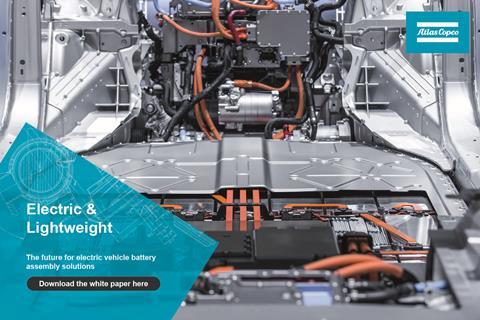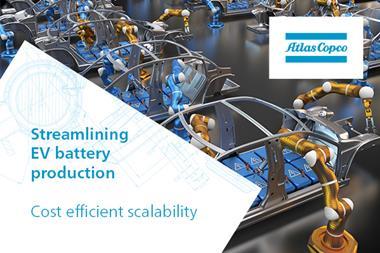White Paper: Electric & Lightweight - The future for electric vehicle battery assembly solutions
By Atlas Copco, sponsor partner
2021-03-12T00:46:00
Spearheading innovation in electromobility, Atlas Copco’s new whitepaper “Electric & Lightweight - The future for electric vehicle battery assembly solutions”, showcases its advances in safe and secure joining technology with 100% repeatable accuracy, traceability and error-proofing.
Atlas Copco spearheads innovations in EV battery assembly
Government legislation across the EU declaring a fundamental shift away from internal combustion towards fully electric vehicle powertrains has presented vehicle manufacturers with complex challenges regarding materials, battery and joining technology.
With the need for light weighting a critical factor in reducing CO2 emissions, manufacturing of EVs requires a variety of innovative approaches. Battery assembly in particular, is a major focus, as they have become an integrated part of the vehicle structure.
In its new white paper entitled “Electric & Lightweight - The future for electric vehicle battery assembly solutions”, Atlas Copco showcases its philosophy for electromobility, in the context of volume EV battery manufacturing. The white paper identifies how every step of the process requires safe and secure joining solutions with 100% repeatable accuracy, in order to shield the sensitive battery cells from both impact and excessive heat.
DOWNLOAD THE WHITE PAPER
Whilst Lithium-ion is the primary battery technology, nickel-metal hydride (NiMH) batteries are also used, predominantly in hybrid vehicles. The chemical hazards are significant, therefore, due to the substances and different combinations of materials used. Consequently, there is a higher risk of exposure to hazardous substances during EV battery manufacture and possibly during vehicle assembly, if the batteries are damaged unintentionally.
In addition, the risks associated with extremely high DC voltages and electromagnetic fields demand that safety during battery assembly is a top priority. Atlas Copco enables manufacturers to mitigate against risk to assembly personnel through a range of measures, which include the use of fully isolated sockets and quick change adapters, as well as insulated tool covers and ‘Slip-Off’ protection for handheld electric assembly tools.
Similarly, battery module assembly involves a number of materials, each fulfilling a particular purpose, such as thermal conductivity and protective bracing. A flexible joining solution for both soft and hard joints is crucial in achieving an assembly process which reduces time and weight, whilst ensuring joint integrity and durability.
As highlighted in the white paper, Atlas Copco’s range of innovative Smart Connected Assembly solutions delivers total uniformity, error-proofing and full traceability in every process, which provides value and reassurance to EV manufacturers.































